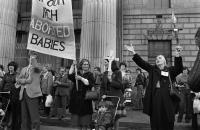‘Christ did not come down from the cross’ was the late Pope John Paul II’s response when questions were raised about his failing health and painfully obvious public suffering in the latter years of his pontificate. So how do we explain the surprise resignation announcement of his successor, Benedict XVI, in contravention of papal tradition (some exceptional medieval cases notwithstanding)? The ‘rules were made to be broken’ adage seems to apply—with the evolution of medical science people are living longer, but not necessarily with their full mental or physical faculties. But the same argument could apply to the evolution of social attitudes and the Church’s line on homosexuality, clerical celibacy and women priests.
Museum eye : Ireland’s Great Hunger Museum
In his painting Departure, Pádraic Reany depicts an apocalyptic human procession trudging across a blighted and bloodied potato field, the emaciated dead lying beneath the feet of the mourners, the living marching towards perpetual exile on a famine ship. The anger of the piece encapsulates the mood of the inaugural exhibition of the newly opened … Read more


